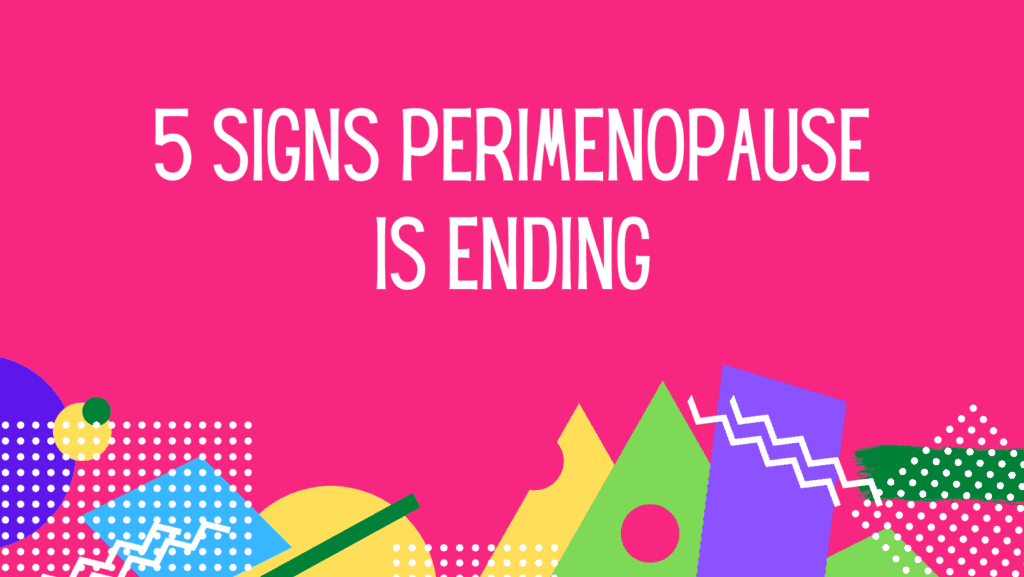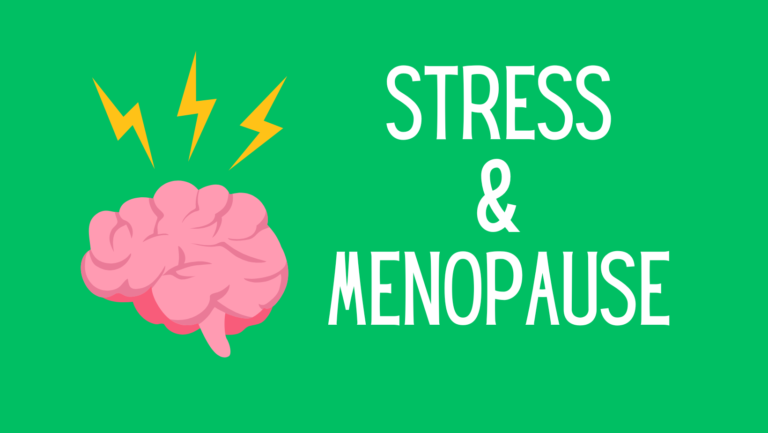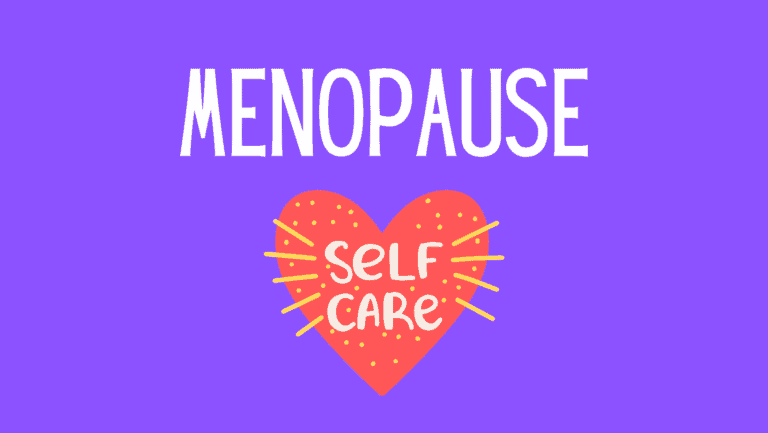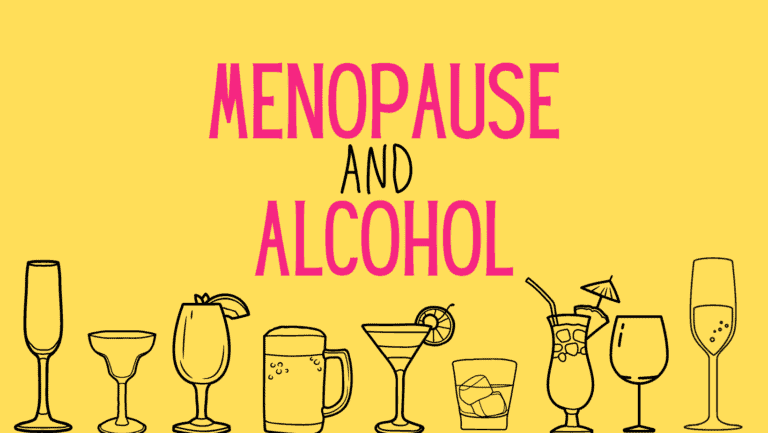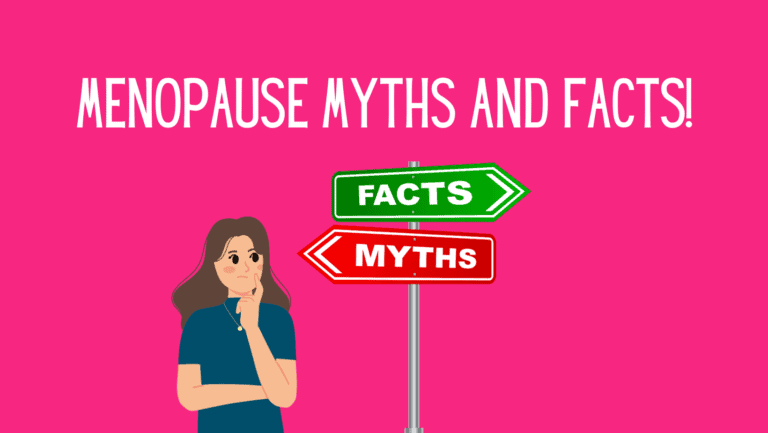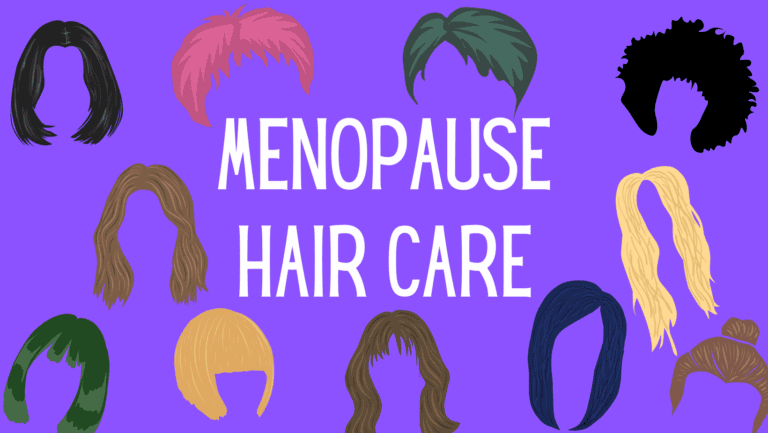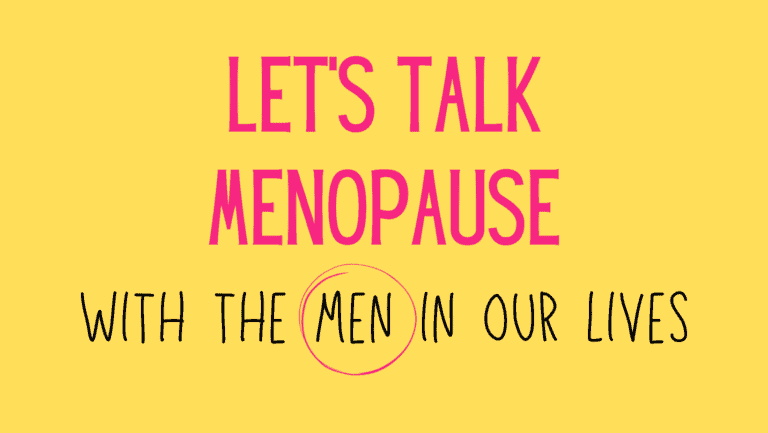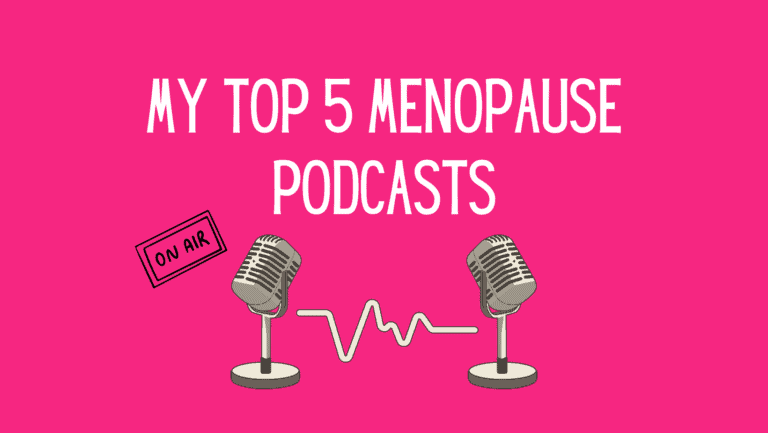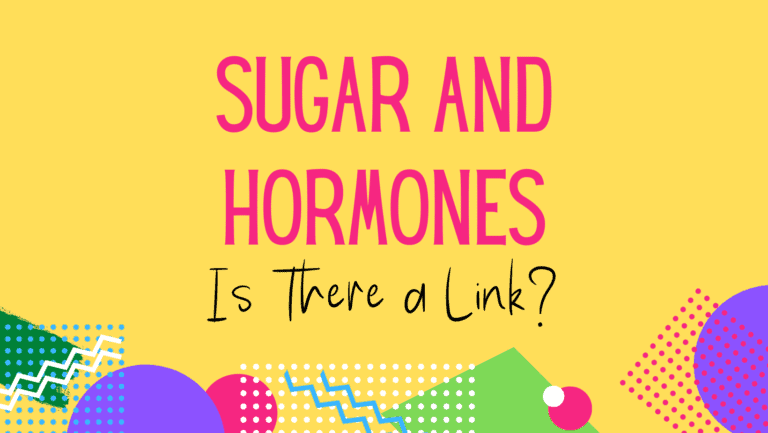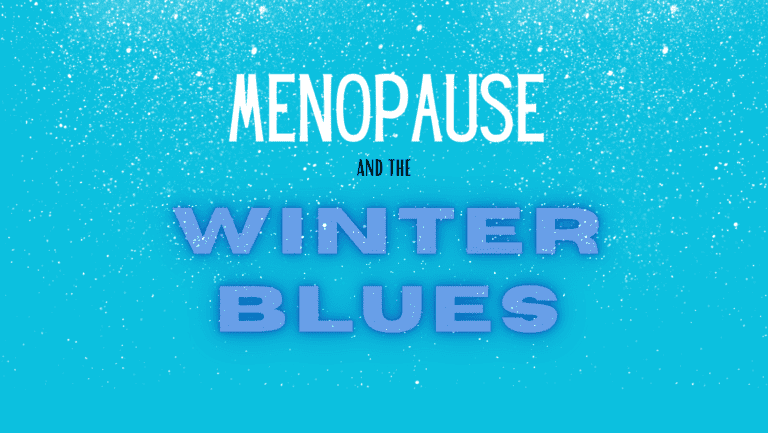Perimenopause can be a tough time in any woman’s life, so desperately searching for signs perimenopause is ending has become my new obsession.
I know that when perimenopause ends, it won’t be a case of me being back to me again 100%, but it will be that time when things start to level out a bit. Or so I am told.
Before I take you through the info I have been collecting for this blog post, let’s look at all things Perimenopause.
What Is Perimenopause?
Perimenopause is when our bodies start to make the natural transition towards menopause. This signals the end of our reproductive years.
The female hormone estrogen starts to fluctuate and decrease in our bodies over time, causing perimenopause symptoms such as headaches, anxiety, hot flashes and bizarre menstrual cycles.
This stage can happen many years before menopause starts and often women like me, who were late 30s, had no idea what I was going through was perimenopause symptoms.
Early perimenopause and perimenopause are when the symptoms are usually at their most rampant due to wildly fluctuating hormones.
Sadly, in these early stages, most women don’t really know what is happening to them. It can be a scary time.
I will say here that hormone replacement therapy (HRT) really worked for me. It helped alleviate 95% of the symptoms I was struggling with.
If you are struggling, please go and speak to a doctor. I am no medical professional, so be sure to talk all this through with someone who is.
If you want somewhere to track all your symptoms (because let’s be honest we can be a tad forgetful!) Then try this tracker.
What Are The Symptoms of Perimenopause?
There are so many more symptoms of perimenopause than I ever realised.
At school, we were taught that you will usually get hot flushes/hot flashes and your period will stop, and then BOOM you are in menopause.
We were taught about menstrual cycles, menstrual flow, hormones, and hot flushes and that was it. Nothing about the menopausal transition.
I had no idea about perimenopause and I certainly had no idea about the many symptoms that can be really upsetting.
I have written a full blog post on perimenopause symptoms and details on what they are all about, but to highlight some of the most common symptoms:
Hot Flushes/Hot Flashes
An overwhelming sense of heat comes over your body, your skin turns red and it all feels a little sweaty.
Hot flushes are controlled by your brain thermostat as opposed to the heat around you. The blood vessels in your body dilate and you start to feel hot.
Brain Fog
My nemesis. Brain fog is when you just can’t seem to recall details, remember names, remember where you put things, and you feel like you might be losing your mind.
I would have clients whom I had known for years and could not recall their names, it was so frustrating.
Anxiety
Anxiety for me showed up in not wanting to do my normal things.
I couldn’t face driving at night, I was fearful of getting on a train to go to work and I thought everyone disliked me.
You might find that anxiety slowly creeps up on you, without you even knowing it.
Sore Joints
Sore joints during perimenopause are a lot more common than you think, so many women suffer from this (I did) and thought it was arthritis.
If you suffer from really sore joints, please get it checked out, there are other risk factors involved and bone health is super important.
Bloating
Ah the meno belly, this is a real pain. The bloating comes out of nowhere and goes nowhere. I looked 6 months pregnant and had no idea why!
Migraine
Severe headaches and migraines are very common in menopausal women. The hormone imbalance in our bodies can bring on the most debilitating headaches.
Tension headaches should be mentioned here. If you are struggling with anxiety, brain fog, and lack of sleep to name a few, then tension headaches are more likely to show up.
Tiredness
Tiredness is usually the label but it is much more like exhaustion, not being able to function or perform regular duties due to being utterly shattered.
These are a small handful of the many perimenopausal symptoms that can show up during this time.
There are many other perimenopause symptoms for you to consider during this menopause transition like mood swings, irregular periods, vaginal dryness, night sweats, weight gain and the list goes on.
Each woman will have a different experience, some women will have a much more simple and relaxed journey through menopause and some women will experience every single symptom.
How Long Does Perimenopause Last?
This stage can last for a very long time, sometimes more than a decade, but the median range is 4 years. This is roughly worked out from when your hormone levels start to drop to your last menstrual period.
I now know I was in early perimenopause at 37 but didn’t know this until I was in my early forties and battling a bunch of symptoms.
I have created a timeline below which shows an approximated timeline for this new stage in our life, but do remember it can start a lot earlier for some women.
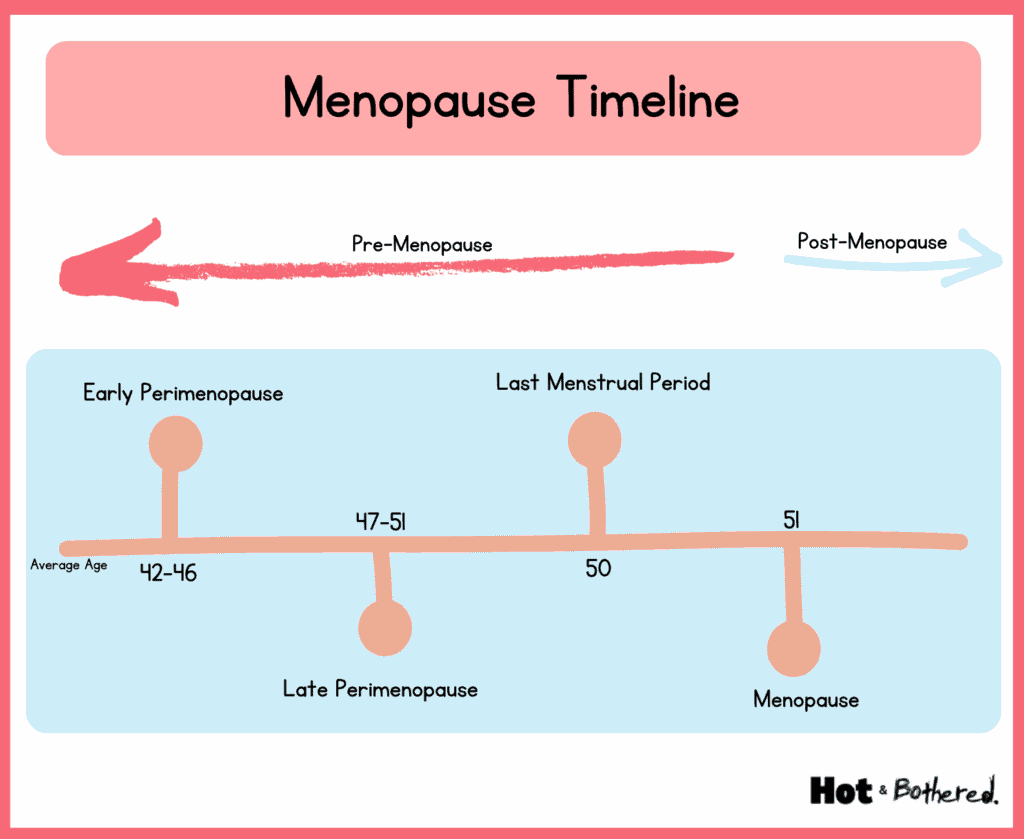
What Are The Signs Perimenopause Is Ending?
Menopause officially begins when you have not had a menstrual period for 12 months you are considered to have transitioned into menopause. This is the main sign perimenopause is ending.
However, there are other signs perimenopause is ending.
I’ve had a look at the main 5 signs so, if like me, you are looking forward to fewer headaches and fewer mood swings, take a look.
Fewer Headaches
Hurrah! This one I am excited about. Thanks to our estrogen levels dancing around in early and mid-perimenopause, severe headaches are common.
As we move towards late perimenopause we will find our headaches become less severe and less frequent.
If I had favourite signs perimenopause is ending, this would be at the top of the list!
Do know that migraines can be about other things. If you want more migraine info, here is a good place to start.
Longer Time Between Periods
Irregular periods are very common during perimenopause but as we near the later stages you will find that the time between them increases.
The general thought amongst medical professionals is that when your periods are 60 days apart, you are in late perimenopause.
Stable Mood
As our hormones fluctuate so does our mood.
75% of perimenopausal and menopausal women experience mood changes so it will come as a great relief that this is going to settle down.
As we head towards menopause our hormones are at an all-time low, but this is a consistent low, which means our mood will stabilise.
More Hot Flushes/Flashes
Hot flushes also known as hot flashes are likely to become more frequent as you draw close the the menopause.
The hormone estrogen regulates temperature so when this drops through the floor drastically it messes with our brain’s ability to regulate our thermostat.
So if you find that hot flushes are back with a vengeance, this is a strong sign you are in late perimenopause.
Less Sleep
I am sorry to be the one to share this with you, but yep, lack of sleep is back!
When our hormone levels drop at such a pace, our perimenopause symptoms come back with force, and this all leads to disturbed sleep.
Night sweats, anxiety, sore joints, the works, it is hardly surprising that getting our beauty sleep is getting harder and harder.
Closing Thoughts
As we come into our menopausal years there will be different menopause symptoms that may affect us, but with estrogen levels being more stable, women tend to be more comfortable.
When perimenopause begins we are usually not in the loop. Many women tend to coast into their early forties without giving menopause a second thought.
Once we are on our perimenopause journey it is wise for us to learn about the menopausal years, when we will get there and what it will look like.
Taking the fear out of this new stage in our lives is what will empower us.
There is a lot we can do to help ourselves during this phase, but please do speak to a doctor to talk through your symptoms, get the correct diagnosis and get some help.
Kathryn x
RESOURCES:
Resources: Mayo Clinic – Perimenopause
American Migraine Foundation – Perimenopause
Mayo Clinic – Perimenopause
Medical News Today – Perimenopause
Revive Research – Perimenopause
The Migraine Trust – Migraines
Table of Contents
Disclaimer: I am not a medical professional, herbal or physical therapist, and I am not educated in the menopause space. All opinions expressed on this blog are my own and should not be taken as medical advice. This blog is intended to share my personal experiences and insights, and should not be used as a substitute for professional advice. Please consult a qualified medical professional, herbal or physical therapist for any health-related concerns. Additionally, I strive to keep things light and entertaining, but please keep in mind that the topics discussed on this blog may be sensitive or triggering for some readers.
Kathryn
Track your symptoms and show them to your doctor
The perimenopause Symptom Tracker
Is your doctor not taking your symptoms seriously?
I was 38 and perimenopausal and no one would take me seriously, so I spent months tracking my symptoms and went back to the doctor armed with as much data as I could. Only then was I tested and it was confirmed I was Perimenopausal.
Get your facts and symptoms in order with this symptom tracker and then present it to your doctor, clearly showing what is happening and when.
